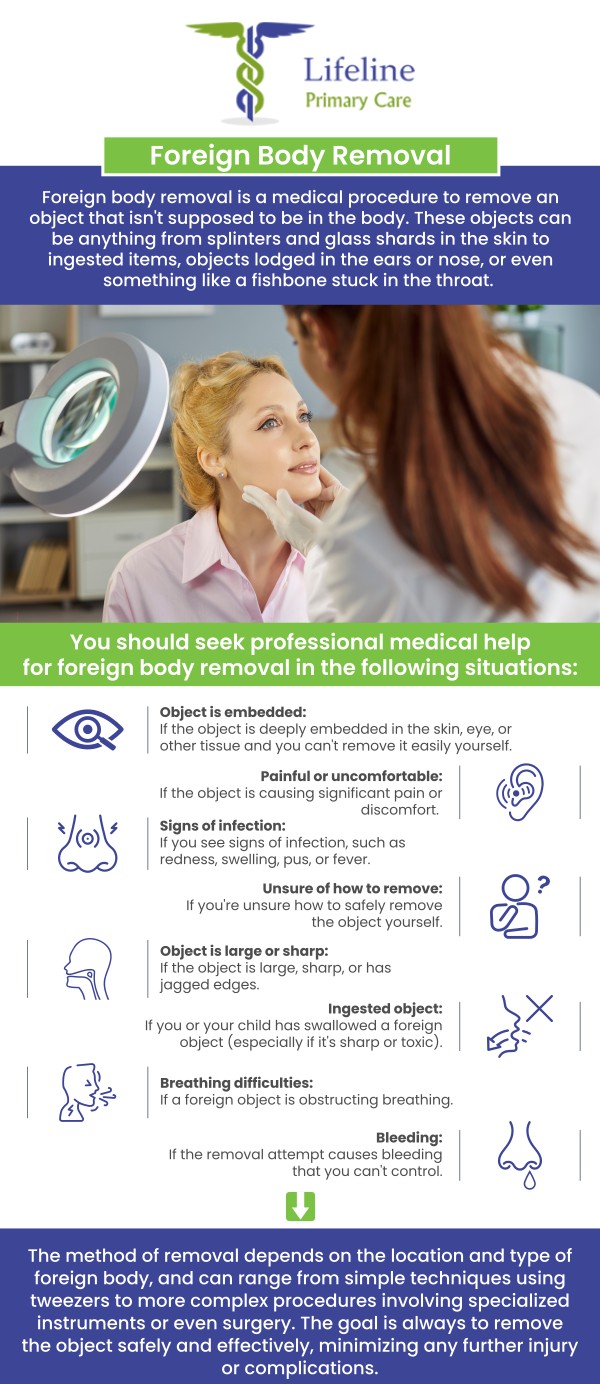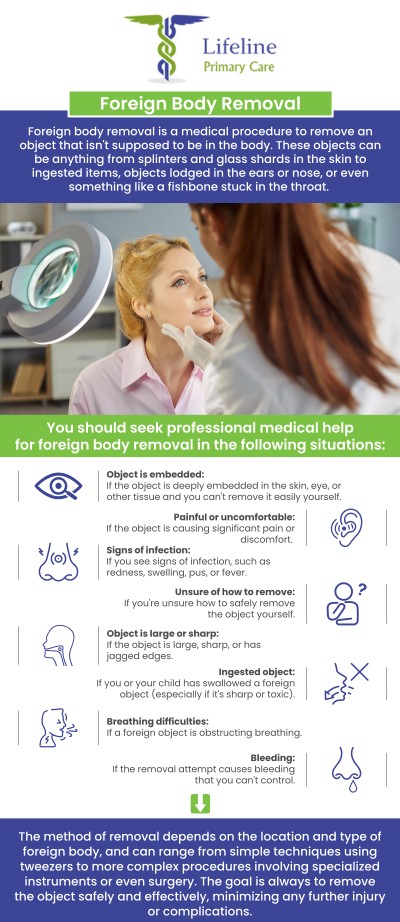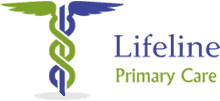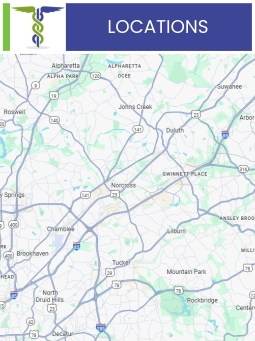Foreign Body Removal Clinic in Lilburn, GA
Foreign body removal is a medical procedure used to remove objects that have become lodged in the body, such as in the skin, eyes, ears, or respiratory tract. These objects can range from splinters and glass to more complex items like inhaled objects or swallowed items. At Lifeline Primary Care, Dr. Aziz Pirani, MD and Dr. Safia Pirani, MD use specialized tools and techniques to ensure that the removal process is quick, effective, and as comfortable as possible. For more information, contact us or request an appointment online. We have convenient locations to serve you in Lilburn Main, Lilburn Main Extension, Lilburn – Snellville, Sandy Springs, Stone Mountain, Duluth, Clarkston, Suwanee, and Norcross GA.


Table of Contents:
What is foreign body removal and when is it necessary?
How is a foreign body removed from the body, and does it require anesthesia?
What are the common types of foreign bodies that need removal?
How quickly should a foreign body be removed to avoid complications?
Foreign bodies are objects that unintentionally enter and become lodged in the body—can happen to anyone, at any age. These may include splinters, glass shards, metal fragments, food pieces, coins, or even small toys. Foreign bodies can become stuck in various areas such as the skin, eyes, ears, nose, throat, airways, or digestive tract.
Prompt removal is especially important when a foreign body is causing pain, discomfort, infection, or poses a risk of injury or obstruction. For example, a child inhaling a small object requires immediate attention to prevent airway blockage, while a piece of glass embedded in the skin can lead to infection if not treated quickly.
We utilize a range of techniques at Lifeline Primary Care, from gentle manual extraction to more advanced procedures when necessary, depending on the location and type of foreign body. If needed, we will refer you to specialized care for complex cases.
The process of removing a foreign body depends on several factors, including its location, size, type, and any potential risks involved.
For minor cases, such as splinters or superficial objects just beneath the skin, our experienced medical team can often remove the item quickly and safely in our clinic using sterile tools like tweezers or forceps. However, if a foreign body is lodged deeper—such as inside the ear, nose, throat, or even the eye—our providers may use specialized instruments, and in some cases, imaging guidance, to ensure safe and effective removal. When needed, we have access to suction devices, endoscopes, or can make small surgical incisions to retrieve the object without causing further harm.
For most simple removals, we use local anesthesia to numb the affected area and minimize discomfort. For more complex cases, or if the foreign body is in a particularly sensitive location, our providers may recommend sedation or general anesthesia—especially for children or anxious patients. The choice of anesthesia is personalized based on each patient’s age, the foreign body’s location and depth, and the complexity of the procedure.
Following removal, we thoroughly clean the area and provide instructions for monitoring for infection or other complications. Our team is here to answer your questions and provide follow-up care as needed, ensuring a safe and speedy recovery.
If you suspect you have a foreign body embedded in your body, do not try to remove it yourself—especially if it is not easily accessible or if you are experiencing pain, bleeding, or risk of further injury. Instead, contact Lifeline Primary Care promptly. Our skilled team is ready to help you with prompt, compassionate, and expert care.
A foreign body is any object that enters the body and isn’t naturally found there. Swift evaluation and medical removal are important to prevent complications such as infection, pain, or impaired function.
Common Situations We Treat:
• Ear: Young children often insert objects like beads, buttons, or cotton swab tips into their ears. Insects or other small items may also become trapped, causing discomfort or hearing loss.
• Nose: Small toys, food particles, paper, or beads can become stuck in the nostrils, especially in curious young children, leading to nasal congestion, bleeding, or infection.
• Throat & Airway: Accidental swallowing of food, coins, batteries, or toy parts can cause choking or breathing problems—these require urgent attention.
• Eyes: Dust, metal or wood shavings, sand, and small insects can irritate or injure the eyes, sometimes causing redness, pain, or vision changes.
• Gastrointestinal Tract: Children sometimes swallow coins, button batteries, magnets, or small toys. Depending on the object and its location, we may recommend observation or urgent removal.
• Skin & Soft Tissue: Splinters, glass, thorns, or metal fragments can become embedded in the skin, leading to pain, swelling, or infection if not properly removed.
How Lifeline Primary Care Can Help:
Our experienced medical team is trained to assess and safely remove a wide range of foreign bodies. We use specialized tools and techniques appropriate for each situation, whether the object is in the ear, nose, throat, eye, skin, or soft tissue. We also provide follow-up care to ensure proper healing and prevent complications.
Foreign bodies should generally be removed as soon as possible—ideally within a few hours of discovery. The urgency depends on the type, location, and associated risks:
• Airway Emergencies: Objects stuck in the throat or windpipe can quickly block breathing and require immediate emergency care.
• Eye Injuries: Sharp or metallic objects in the eye can cause infection, tissue damage, or vision loss if not treated urgently.
• Soft Tissue Injuries: Even seemingly minor objects in the skin or muscle can lead to infection, tissue damage, or abscesses if not addressed promptly.
• Swallowed Objects: Most small, blunt objects that are swallowed may pass safely, but urgent attention is needed if the object is sharp, large, or causing pain, vomiting, or signs of blockage.
Risks of Delay:
Delaying removal can increase the risk of infection, chronic pain, tissue damage, and other serious complications. That’s why Lifeline Primary Care encourages patients to seek evaluation as soon as a foreign body is suspected.
If you suspect a foreign body injury, don’t wait—contact Lifeline Primary Care immediately for evaluation and appropriate treatment. For more information, contact us or request an appointment online. We serve patients from Lilburn Main GA, Lilburn Extension GA, Lilburn – Snellville GA, Sandy Springs GA, Stone Mountain GA, Duluth GA, Clarkston GA, Suwanee GA, Norcross GA, Tucker GA, Alpharetta GA, Sugar Hill GA, Scottdale GA, Decatur GA, Doraville GA, Dunwoody GA, Roswell GA, Chamblee GA, Redan GA, Gresham Park GA, Johns Creek GA, Buford GA, and surrounding cities.
Check Out Our 5 Star Reviews


Additional Services You May Need
• Sports Physical Exam
• School Physical Exam
• X-Ray
• Foreign Body Removal
• Minor Surgeries
• Confidential STD Screening
• Allergy Testing
• Immigration Physical Exams
• IUD Insertion
• DOT Physical Exam
• Knee Gel Injections
• Chronic Care Management
• Women’s Health
• Vitamin B12 Injections
• Myers Cocktail IV Therapy
• Weight Management
• Suturing Clinic
• Incision and Drainage
• Dermatological Procedures
• Skin Tag Removal
• Toenail Removal
• Biopsies
• Lab Services
• Lead Screening
• TB Screening
• Hearing/Vision Test
• EKG Services
• Spirometry Testing
• Echocardiograms
• Ultrasounds
• ABI (Circulation Test)
• Urine Drug Testing
• Nerve Conduction Studies
• Annual Physicals
• Immunotherapy
• Neuro Scans
• Employment Physicals
• Medicare Wellness Exams
• VAT/ENG Studies
• Autonomic Nervous System Scans
• Nuclear Scans
• Acute Care
• Smoking Cessation
• Immunizations
• Joint Injections
• Vaccinations
• Covid-19 Vaccines
• Nexplanon
• Primary Care

Additional Services
You May Need
• Sports Physical Exam
• School Physical Exam
• Primary Care
• X-Ray
• Foreign Body Removal
• Minor Surgeries
• Confidential STD Screening
• Allergy Testing
• Immigration Physical Exams
• IUD Insertion
• DOT Physical Exam
• Knee Gel Injections
• Chronic Care Management
• Women’s Health
• Vitamin B12 Injections
• Myers Cocktail IV Therapy
• Weight Management
• Suturing Clinic
• Incision and Drainage
• Dermatological Procedures
• Skin Tag Removal
• Toenail Removal
• Biopsies
• Lab Services
• Lead Screening
• TB Screening
• Hearing/Vision Test
• EKG Services
• Spirometry Testing
• Echocardiograms
• Ultrasounds
• ABI (Circulation Test)
• Urine Drug Testing
• Nerve Conduction Studies
• Annual Physicals
• Immunotherapy
• Neuro Scans
• Employment Physicals
• Medicare Wellness Exams
• VAT/ENG Studies
• Autonomic Nervous System Scans
• Nuclear Scans
• Acute Care
• Smoking Cessation
• Immunizations
• Joint Injections
• Vaccinations
• Covid-19 Vaccines
• Nexplanon




